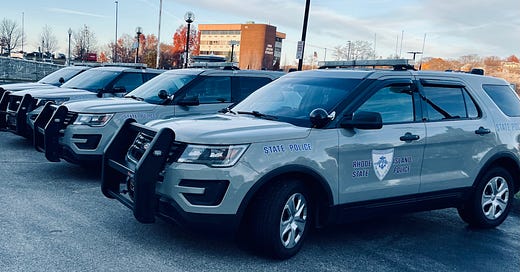Press release: Community organizations call for police reform to be a priority during the 2024 General Assembly session
“The Black Lives Matter protests shone a spotlight on the urgent need for police reform, a need that has not diminished with time...”
From a press release:
Nine Rhode Island organizations have sent a letter to the Rhode Island House and Senate leadership and legislators on the first day of the 2024 legislative session, urging them to prioritize this year the passage of police reform bills beyond LEOBOR (Law Enforcement Officer’s Bill of Rights) that are aimed at promoting police-community relations.
The letter, signed by the American Civil Liberties Union of Rhode Island, Black Lives Matter Rhode Island PAC, COYOTE RI, Direct Action for Rights and Equality, Latino Policy Institute, Open Doors Rhode Island, Rhode Island Commission for Human Rights, Rhode Island for Community and Justice, and the Substance Use, Policy, and Education PAC, noted the extensive legislative work done on police reform elsewhere in the country since the emergence of the Black Lives Matter movement in 2020, but the comparatively slim number of similar pieces of reform legislation passed in Rhode Island.
“Rhode Island is regrettably lagging behind the national momentum in passing crucial criminal justice reform legislation, perpetuating disparities that disproportionately impact communities of color.” - Harrison Tuttle, executive director of the BLM RI PAC.
The letter cites several examples of bills that have received strong organizational and community support, yet have yet to see substantive movement, including the following:
The legislature has failed for three legislative sessions to reinstate a statute that expired in July of 2020 which requires the collection and analysis of traffic stop data for evidence of racial profiling, a law which many other states have adopted. Rhode Island, which was the first state to pass such a law back in 2000, now lags.
The General Assembly has heard legislation since 2021 that would restrict certain types of use of force by police officers, but the legislation has died in committee each year. In the meantime, between May 2020 and October 2021 alone, 24 states statutorily either restricted or banned the use of chokeholds in the course of policing.
Rhode Island is one of only two states in the country that does not have a decertification mechanism for officers who have engaged in misconduct, and bills to end that distinction have died in committee.
Efforts through legislation to promote greater public accessibility to police department findings of misconduct by its officers have been stymied.
The letter acknowledges indications that 2024 will finally be the year that the General Assembly will make some reforms to the most protective Law Enforcement Officer Bill of Rights in the country – and the only state in New England with such a law in any form. But the letter claims that “it would be a mistake to view partial reform of the LEOBOR statute alone as a sufficient response to the legitimate advocacy for broader police reform that we and so many others have actively sought and that remains urgently needed.” Concluding with an emphasis on the urgency of these pieces of legislation, the letter asks all legislators to ensure that police reform is a central part of their 2024 legislative goals.
“Rhode Island is regrettably lagging behind the national momentum in passing crucial criminal justice reform legislation, perpetuating disparities that disproportionately impact communities of color,” said Harrison Tuttle, executive director of the BLM RI PAC. “Lawmakers must proactively educate themselves on the adverse effects our state’s delays have on marginalized communities and show the commitment to supporting legislation that effectively addresses and ends these pervasive inequities.”
“The Black Lives Matter protests shone a spotlight on the urgent need for police reform, a need that has not diminished with time,” added ACLU of RI executive director Steven Brown. “We are hopeful that the General Assembly will make 2024 the year to comprehensively address this critical community issue.”




The leadership of the RI legislature has zero conscience and supports violence against the community by the police. That they have been unwilling to eliminate LEOBOR clearly demonstrates a support for police violence against the community. That they are unwilling to rein in the police in any way shows true injustice and incompetence.